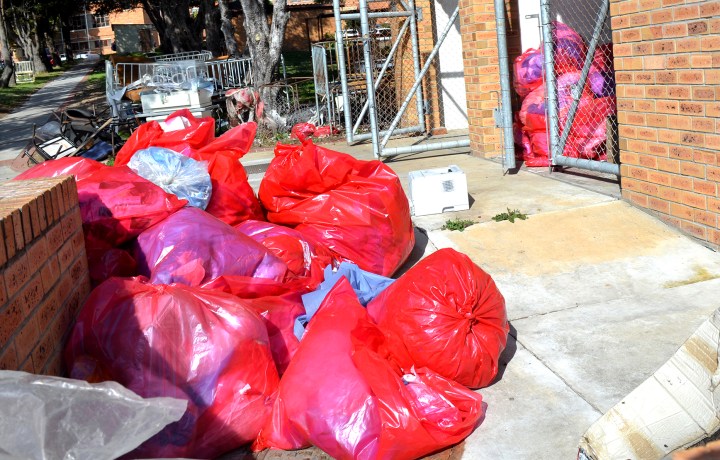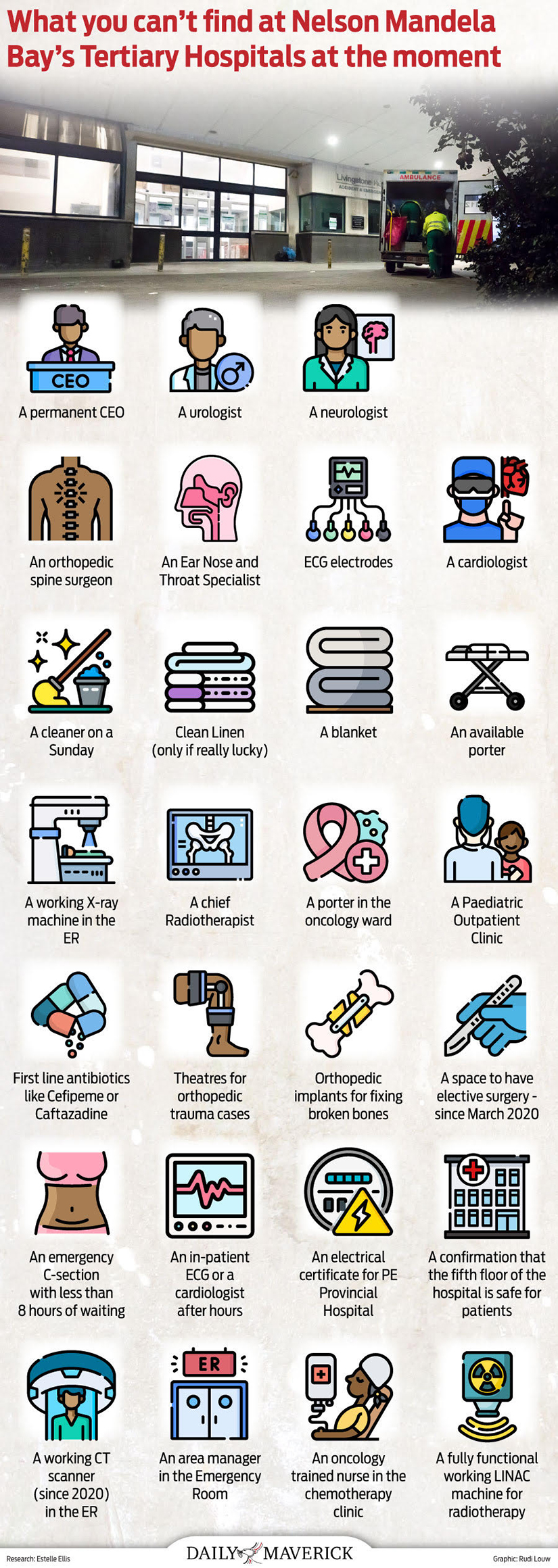EMERGENCY EXIT
Poor controls at Nelson Mandela Bay hospitals drove 42 cases of rare bacterial infections

Conditions in Nelson Mandela Bay’s state hospitals drove the outbreak of a rare bacterial infection over the past few months due to ‘suboptimal infection prevention and control measures’, the National Institute for Communicable Diseases said last week. The NICD has confirmed that 42 cases of Salmonella Isangi infections were found in the hospitals over the past few months.
“Suboptimal infection prevention and control measures” had led to an outbreak of a unique strain of the Salmonella bacteria in Nelson Mandela Bay’s three state hospitals, with 42 people being diagnosed with the disease.
The disease caused by this bacteria is known as nontyphoidal salmonellosis.
The hospitals affected are Uitenhage Provincial Hospital, Dora Nginza Hospital and Livingstone Tertiary Hospital
The alarm was first raised about the outbreak earlier this year by the district manager for Nelson Mandela Bay, Darlene de Vos, who said they had seen an increase in community cases especially in Kariega, and especially in children. She said they were tracking bodies of standing water as the source of possible contamination.
Eating contaminated food or drinking contaminated water, or touching infected animals, their faeces or their environment can cause infections.
When questions were sent to the Nelson Mandela metro’s public health department, it appeared that they were unaware of the outbreak.
Nontyphoidal salmonellosis is caused by the same family of bacteria that causes typhoid or enteric fever.
The symptoms of the disease are diarrhoea, fever, and stomach cramps.
Symptoms usually begin six hours to six days after infection and last four to seven days but some patients develop more serious infections in the urinary tract, blood, bones, joints and nervous system that can last for weeks and cause severe disease.

The head of the National Institute for Communicable Diseases’ Centre for Enteric Diseases, Dr Juno Thomas confirmed the outbreak of nontyphoidal salmonellosis in the metro. Thomas was one of the leading scientists in the country’s response to the outbreak of listeriosis in 2017.
“It is a protracted outbreak caused by a unique ‘strain’ of Salmonella known as Salmonella Isangi,” she said but pointed out that this specific outbreak was driven by hospital-acquired infections.
She explained that they had sequenced samples from patients in the Eastern Cape who had been diagnosed with nontyphoidal salmonellosis since 2021 and had found this unique strain in cases being diagnosed in the last few months of 2021.
“From April through July 2022 there was a noticeable increase in cases; case numbers peaked in May and decreased steadily thereafter.
“The total number of cases is 42 to date, of which 36 case-patients had symptoms or evidence of illness from infection, and six case-patients were asymptomatic (ie they had no symptoms or evidence of illness, but were detected when all patients in the affected hospital wards were tested).
“Most cases were patients at the three largest public hospitals in the [metro] and following an outbreak investigation it was determined that this outbreak was a multifacility healthcare-associated outbreak. Transfer of patients between these facilities is common practice, and likely facilitated transmission of the strain from patients in one hospital to the next.
“Following the implementation of targeted and enhanced infection prevention and control measures in these hospitals, the number of cases decreased and no cases have been identified since the end of July 2022,” Thomas added.
She explained that although the usual sources and modes of transmission for nontyphoidal Salmonella are related to food and animals (through eating contaminated food or drinking contaminated water, or having direct contact with infected animals or their environment), healthcare-associated infections and outbreaks (although uncommon) has happened in the past.
“The predominant mode of transmission in healthcare-associated outbreaks has been reported as person-to-person transmission, resulting from suboptimal infection prevention and control measures.”
In a letter addressed to the Livingstone Tertiary Hospital management, clinicians had raised their grave concern about the hospital-driven outbreak of this infection confirming that cases were seen in Uitenhage Provincial Hospital, Dora Nginza Hospital and Livingstone Tertiary Hospital “in addition to the normal array of drug-resistant bacteria C.difficile diarrhoea and tuberculosis.
“This is impossible to stop without the adequate infrastructure, cleaning staff and clinical staff ratios,” they warned.
Inadequate cleaning is one of the issues raised by clinicians in a number of letters that were written to hospital management in the metro. Other issues that clinicians are saying is making it difficult to provide adequate health services in the metro is a dire shortage of staff, equipment, medicine and linen. DM/MC





















 Become an Insider
Become an Insider
The public hospitals in our health service are failing our population. Big Time. It is a crying shame. We spend enough money it just doesn’t reach where it is supposed to go.